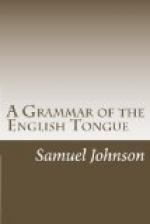That is, that particular fruit, and this world in which we live. So, He giveth fodder for the cattle, and green herbs for the use of man; that is, for those beings that are cattle, and his use that is man.
The is used in both numbers.
I am as free as Nature first made
man,
Ere the base laws of servitude began,
When wild in woods the noble savage ran.
Dryden.
Many words are used without articles; as
1. Proper names, as John, Alexander, Longinus, Aristarchus, Jerusalem, Athens, Rome, London. God is used as a proper name.
2. Abstract names, as blackness, witch-craft, virtue, vice, beauty, ugliness, love, hatred, anger, good-nature, kindness.
3. Words in which nothing but the mere being of any thing is implied: This is not beer, but water; this is not brass, but steel.
* * * * *
Of nouns substantive.
The relations of English nouns to words going before or following are not expressed by cases, or changes of termination, but, as in most of the other European languages, by prepositions, unless we may be said to have a genitive case.
Singular.
Nom. Magister, a Master, the Master.
Gen. Magistri, of a Master, of the Master,
or
Master’s, the Master’s.
Dat. Magistro, to a Master, to the Master.
Acc. Magistrum, a Master, the Master.
Voc. Magister, Master, O Master.
Abl. Magistro, from a Master, from the Master.
Plural.
Nom. Magistri, Masters, the Masters.
Gen. Magistrorum, of Masters, of the Masters.
Dat. Magistris, to Masters, to the Masters.
Acc. Magistros, Masters, the Masters.
Voc. Magistri, Masters, O Masters.
Abl. Magistris, from Masters, from the Masters.
Our nouns are therefore only declined thus:
Master, Gen. Master’s. Plur. Masters.
Scholar, Gen. Scholar’s. Plur. Scholars.
These genitives are always written with a mark of elision, master’s, scholar’s, according to an opinion long received, that the ’s is a contraction of his, as the soldier’s valour, for the soldier his valour: but this cannot be the true original, because ’s is put to female nouns, Woman’s beauty; the Virgin’s delicacy; Haughty Juno’s unrelenting hate; and collective nouns, as Women’s passions; the rabble’s insolence; the multitude’s folly: in all these cases it is apparent that his cannot be understood. We say likewise the foundation’s strength; the diamond’s lustre; the winter’s severity: but in these cases his may be understood, he and his having formerly been applied to neuters in the place now supplied by it and its.
The learned and sagacious Wallis, to




